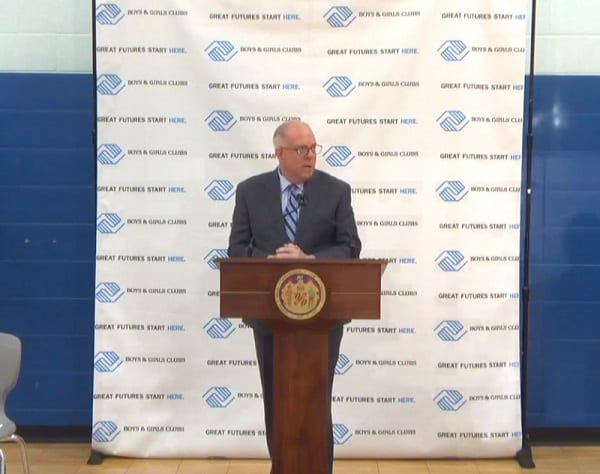ANNAPOLIS, MD—Governor Larry Hogan on Thursday announced the launch of Project Bounce Back, a $25 million first-in-the-nation public-private partnership to help Maryland youth recover from the impacts of the COVID-19 pandemic. This series of initiatives will provide strategic mental health services, expand the footprint of youth development programs, and develop an innovative, data-driven digital solution to build post-COVID resilience among Maryland’s youth, families, and communities.
The partnership includes the Maryland State Department of Education, the Governor’s Office of Crime Prevention, Youth, and Victim Services, the Boys and Girls Clubs of America, Microsoft, LinkedIn Learning, KPMG, Discourse Analytics, and eCare Vault.
The governor also signed an executive order to make Maryland a national leader in working to address “Adverse Childhood Experiences” or ACEs. The executive order can be viewed online here.
“As the governor, but also as a father and a grandfather, nothing breaks my heart more than to see what our children have suffered through over the past year, especially those kids who are growing up in underserved communities, and I refuse to just sit back and accept this as the status quo,” said Governor Hogan. “The mission of this new initiative is to provide critical services to young people in need and to build post-COVID resilience among Maryland youth, families, and communities.”
Thursday’s announcement was made in the gymnasium of the Webster Kendrick Boys & Girls Club in Baltimore City. The governor was joined by Lt. Governor Boyd K. Rutherford, Maryland State Superintendent of Schools, Dr. Karen Salmon, Glenn Fueston, Executive Director of the Governor’s Office of Crime Prevention, Youth, and Victim Services, Lorraine Orr, COO for the Boys & Girls Clubs of America, and Lockerman-Bundy Elementary School Principal Kimberly Hill-Miller.
PROJECT BOUNCE BACK:
Expansion of Maryland Alliance of Boys & Girls Clubs
Through Project Bounce Back, the Maryland Alliance of Boys & Girls Clubs will expand to every county in Maryland, prioritizing Title 1 school districts and rural communities, to reach 45,000 children across all jurisdictions with youth development programs and positive mentorship.
As part of this expansion, the state is launching a new partnership between the Maryland State Police and the Maryland Alliance of Boys & Girls Clubs to promote positive mentorships and grow community and police relationships.
State Mental Health Crisis Teams
Project Bounce Back includes the launch of six regional mental health crisis teams through the Maryland State Department of Education. Each team will be composed of counselors, psychologists, and experts to collaborate with local school systems in order to provide on-the-ground crisis and technical assistance.
“Students in Maryland and across the country have been impacted by the pandemic academically, physically, socially, and emotionally,” said Dr. Salmon. “MSDE’s new regional mental health crisis teams will work closely with local school systems to connect students to needed emotional and social supports. We are pleased to be part of this exciting overall state partnership to prevent and address adverse childhood experiences. The effectiveness of our regional task force efforts will be bolstered by these evidence-based after school and summer programs and customized technology—all focused and working hand-in-hand to support the well-being and resilience of our youth across the state.”
New Technology Platform
Private sector partners, including Microsoft, LinkedIn Learning, KPMG, Discourse Analytics, and eCare Vault, are providing an innovative new technology platform that will enable nonprofits, like Boys & Girls Clubs, to provide better services and job development skills to local youth.
Data shows that unmitigated ACEs can have long-lasting impacts and lead to negative health and social outcomes for young people as they grow up. According to the Centers for Disease Control and Prevention, ACEs are potentially traumatic events that occur in childhood before the age of 18 such as abuse, neglect, witnessing violence, or having a family member attempt or die by suicide. A national survey on Children’s Exposure to Violence found that ACEs are common, with 60% of Americans exposed to violence in the prior year, and the Maryland Department of Health found that 47% of adults reported encountering at least one adverse childhood experience before they reached 18-years-old.
Funding for Project Bounce Back was made possible through CARES Act funding as a part of the Coronavirus Emergency Supplemental Funding Program.
Video from Thursday’s press conference can be viewed below.
Do you value local journalism? Support NottinghamMD.com today.

